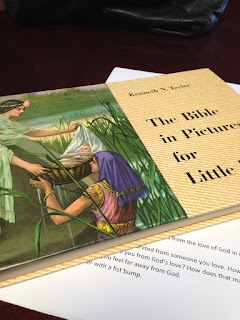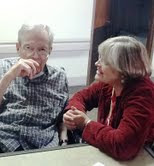John 10:10b-18
The first theologians I ever knew – were my parents.
They didn’t use big words like “justification” or
“hermeneutics” but they said things to me that even they probably don’t know –
influenced me – and what I believe.
I don’t know if that makes you hopeful – or nervous.
Take my mom, for example.
When we were in junior high, our congregation built a new
sanctuary! It was larger and
impressive. And it had a balcony!
Not like our choir loft here, but a balcony that went
almost all the way around the church.
We were excited!
But, our mom wouldn’t let us sit up there.
She said (and I apologize to the choir here) that “the
balcony was for spectators, not participants.”
Hmmmm. You mean
worship is something I am supposed to PARTICIPATE in? You mean I am supposed to engage in
worship?
You mean worshipping God is ACTIVE? Theology.
Or my dad.
I don’t remember the occasion now, but sometime after a
local tragedy, when people were talking about those who didn’t die and saying
that “God was with them,” my dad said,
“what about the people who died? Wasn’t God with them, too? What about people who get sick and DON’T
recover? Isn’t God with them too? Is God only with us with things are going
well?”
Theology.
Theology.
God-Talk. That’s the third step
of the faith 5.
Two weeks ago we learned the first step.
Sharing with each other our highs and our lows, our joys
and our sorrows, being vulnerable and creating deeper relationships of
trust: in our families, with our
friends, in our congregation.
Last week we learned the second step: READ.
Read scripture together.
A verse a day, a story a week, whatever, whatever works for you, for
your family.
And we even shared some scripture.
I think that today’s step, TALK, is the hardest-- at least for a sermon – I mean, to TALK about
TALKING.
That just sounds
boring!
I don’t want to talking about talking.
But what the third step is about is how we learn to
connect God to our lives, to share how
God is in our lives, and to learn to do that – it’s spiritual dynamite.
And we do that by sharing a particular scripture, and how
it connects to our lives.
In Rich Melheim’s instructions about the Faith 5, he asks
families in particular to try to tie their own highs and lows of the day to the
verse or story that they read.
And I’ll be honest:
That’s hard. You might not be
able to do it all of the time, or even most of the time, at first.
But even though you can’t tie the verse to your daily
highs and lows, you can still “talk about it.”, using the words from
Deuteronomy 6. “Keep these words that I am commanding you today in your
heart. Recite them to your children and
talk about them when you are at home. Talk about them when you are
away. Talk about them when you lie
down. Talk about them when you
rise. Talk about them.”
Sometimes you will be able to connect them with your
day.
Other times you may not.
But talk about them.
Tell your children and your grandchildren what you think,
what you feel, what you believe. Ask
them the same.
I was so inspired by the people who shared their favorite
verses and stories last week that I asked the same thing at our council meeting
on Monday night.
What’s your favorite Bible verse and what does it mean to
you? And you know what, a few of us
shared as well.
One woman shared the verse from the Book of Esther, “who
knows but that you have come to your position for such a time as this?” She
wondered the same thing about herself, and about our congregation.
One man shared about learning just how blessed he was in
comparison with most of the world, and it changed how he read the scriptures
about giving, and about money, and about what true wealth really was.
It changed how he saw himself and the world.
And as I listened, I thought that I would like more of us
to be able to do this: do know and be
able to share with one another scripture and God-talk. Theology.
So it’s for families, for our children, but not just for
them.
It’s for the strength of our congregation, as well.
The people of Israel needed those instructions from God
because they lived in a world where their neighbors did not know the Lord, know
Yahweh, where they lived by different, more brutal values,
and where it would be a challenge for them to remain
faithful to the way of their God, who called them to remember the poor, and to
protect the vulnerable, to feed the hungry.
So he called on them to know the Word, to recite it, and
to talk about it…..
so, that, again, we will know who and whose we are… so
that we will know and recognize God’s presence ... And what is our purpose in life
Bringing Scripture and our lives together: That’s theology.
And it’s powerful when we can talk TOGETHER, and
strengthen and encourage one another.
It’s not an easy world we live in.
It wasn’t an easy world for the first Christians,
either.
And so Jesus called himself, the Good Shepherd, the one
who laid down his life for the sheep, and also – in the verse just before it,
the one who gives us abundant life.
But here’s a theological question: What does abundant life look like?
You know, we usually separate these two verses. We hear one of them, about abundant life, on
one Sunday, and one of them, about the Good Shepherd, on another Sunday.
But what if we heard them together.
I came that they
may have life, and that they may have it abundantly. I am the good shepherd.
The Good shepherd lays down his life for the sheep. What does abundant life look like?
What will you tell your children? What will your children tell you?
It looks like being rich.
It looks like being successful.
It looks like being popular. It looks like being thin. It looks like having a lot of “stuff
And our culture tells us that we are not “enough.” (good
enough – young enough – old enough – we need to be and have MORE)
Because – you know – it wants to sell us stuff. But what does God say? What does abundant life look like? (Ask for responses.)
We have abundant life simply because the good shepherd
laid down his life for us
And he laid down his life for us because he loves us –
just as we are.
He didn’t lay down his life so that he could love us, but
because he already does.
We are already beloved, and that measure – that’s the
only one that matters – not anything else the world tells us.
Just the shepherd’s voice.
TALK. Talk to your
children. Listen to them.
Listen to the word, and the voice of the shepherd.
It’s a matter of life and death.
It’s a matter of love..
For all of us, young and old and everyone in between, God’s people.
AMEN


